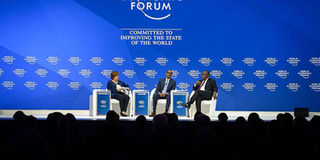Inequality an injustice that must end

Left t right: World Bank CEO Kristalina Georgieva, Rwandan President Paul Kagame and South African President Cyril Ramaphosa attend a session during the World Economic Forum annual meeting on January 24, 2019 in Davos, eastern Switzerland. The scourge of inequality has permeated every sector of the economy. PHOTO | FABRICE COFFRINI | AFP
What you need to know:
- The ramifications in the health status greatly affect morbidity and mortality rates within the country with rich Kenyans expected to live longer than poor Kenyans.
- The majority poor need to take back their power by questioning, calling to account and organising collectively to sound their voices at their own tune.
As the world’s plutocrats gathered in Davos, Switzerland, last week for this year’s World Economic Forum to tackle global issues such as populism and increasing inequality, some have observed that the forum continues to be a symbol of global inequality.
In fact, Fight Inequality Alliance (FIA) members were mobilising around the world at the same time (Tuesday to Friday) for the Fight Inequality Week of Action 2019 to take on alleged unjust distribution of wealth and power.
The annual global forum would witness a glut of the world’s global elites — including business titans, politicians, world leaders, academics, NGOs and activists.
It somewhat amuses and annoys me that the top few wealthy would converge on a luxurious ski resort to discuss the plight of the majority poor, who are not represented, and purport to seek solutions to problems of their own creation.
TAXES
Well, aren’t the same people and corporations absconding paying their fair share of taxes?
The richest continue to enjoy booming fortunes while enjoying some of the lowest levels of tax in decades. The poor are, definitely, being served on the menu.
According to a report by Oxfam, one of the over 100 members of FIA, the 26-richest people on earth last year had the same net worth as the poorest half of the world’s population — some 3.8 billion people.
The report further claims that 2,200 billionaires worldwide saw their wealth grow by 12 percent while Kenya’s 8,300 richest people have the same wealth as the rest of the population — close to 45 million people.
Moreover, the richest 10 percent of the people in Kenya earned, on average, 23 times more than the poorest 10 percent.
EDUCATION
The scourge of inequality has permeated every sector of the economy, where unequal access to opportunities, such as healthcare and education, is rife.
The government’s decision to exempt aircraft spare parts from value added tax (VAT) while textbooks and medicines continue to be blighted with the tax burden could pose for a classic case of polarisation.
Since the early 2000s, Kenya’s level of spending on education has gradually fallen every year.
Nearly a million primary school-age children are out of school — the ninth-highest number of any country.
The 2014 Kenya Demographic and Health Survey (KDHS) further shows the economic polarisation, revealing that a girl from a poor family is 17 times more likely to have never gone to school than her peer from a rich home.
HEALTHCARE
The health sector has seen some improvements over the past decade.
However, a recent study estimated that nearly 2.6 million people fall into poverty or remain poor due to ill health every year.
The ramifications in the health status greatly affect morbidity and mortality rates within the country with rich Kenyans expected to live longer than poor Kenyans.
Life expectancy in the Kibera slums, for instance, has been estimated to be as low as 30 years, compared to the national average of 65 years.
Gender inequality is also prevalent. Globally, women earn 23 per cent less than men, who own 50 per cent more of the total wealth than women.
Further, women are suffering more due to unpaid care work.
JUSTICE
For example, despite 96 percent of Kenya’s rural women population working on farms, only six percent of them hold a title deed.
Consequently, inequality makes the fight to end poverty much harder. It undermines trust in societies and increases crime.
It also has profound implications for the future of our children and the opportunities they will have to live a better life.
Inequality has an impact on all aspects of Kenyan life — from health to education and access to justice, where many poor people avoid formal courts due to legal fee and language barrier.
For a long time, the poor have lent their voice to the rich, who have manipulated and maligned those voices to sound at the tune of their bidding.
ACTION
Emancipation does not come by easily; it takes concerted efforts and relentless consistency.
A few years ago, a woman that I highly esteem, author and activist Muthoni Likimani, in explaining the intrinsic struggle within women in their quest for empowerment, gave an analogy of a goat tethered in the dark corner of a hut.
Upon its release into the sunshine, it retreats into the darkness, afraid to face the light — afraid at what it means to be finally free.
The majority poor need to take back their power by questioning, calling to account and organising collectively to sound their voices at their own tune.
Ms Mwende is a communications consultant. @yvonneemwende





